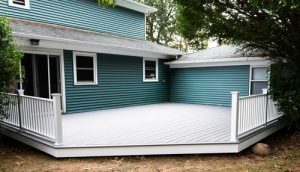 When it comes to choosing a material for your deck, there are several options available on the market. Two of the most popular choices are vinyl decking and composite decking. Both materials have their own unique advantages and disadvantages, so it’s important to weigh the pros and cons of each before making a decision. In this blog post, we’ll take a closer look at vinyl decking and composite decking to help you determine which option is the best fit for your needs.
When it comes to choosing a material for your deck, there are several options available on the market. Two of the most popular choices are vinyl decking and composite decking. Both materials have their own unique advantages and disadvantages, so it’s important to weigh the pros and cons of each before making a decision. In this blog post, we’ll take a closer look at vinyl decking and composite decking to help you determine which option is the best fit for your needs.
Vinyl Decking
Vinyl decking is a synthetic material made from polyvinyl chloride (PVC). It is known for its durability, low maintenance requirements, and resistance to mold, mildew, and moisture. Vinyl decking is available in a variety of colors and styles, making it a versatile option for homeowners looking to create a custom look for their outdoor space. Additionally, vinyl decking is easy to clean and doesn’t require staining or sealing like traditional wood decks.
One of the main advantages of vinyl decking is its longevity. Vinyl decking can last up to 25 years with proper care and maintenance, making it a long-term investment for homeowners. Additionally, vinyl decking is resistant to fading, warping, and splintering, making it a great choice for high-traffic areas and families with children or pets. Vinyl decking is also environmentally friendly, as it is made from recycled materials and is recyclable at the end of its life cycle.
While vinyl decking has many advantages, there are a few drawbacks to consider. One of the main disadvantages of vinyl decking is its cost. Vinyl decking is typically more expensive than other decking materials, such as wood or composite. Additionally, vinyl decking can be prone to scratching and staining, so it’s important to use caution when moving furniture or grilling on the deck. Lastly, some homeowners may not like the look of vinyl decking, as it can have a more synthetic appearance compared to other materials.
Composite Decking
Composite decking is a blend of wood fibers and recycled plastic materials that is designed to mimic the look of traditional wood decks while providing the durability and low maintenance of synthetic materials. Composite decking is available in a wide range of colors and styles, making it a versatile option for homeowners looking to customize their outdoor space. Composite decking is also resistant to mold, mildew, and moisture, making it a great choice for areas with high humidity or frequent rain.
One of the main advantages of composite decking is its durability. Composite decking can last up to 25 years or more with minimal maintenance, making it a long-term investment for homeowners. Additionally, composite decking is resistant to fading, warping, and splintering, making it a great choice for families with children or pets. Composite decking is also eco-friendly, as it is made from recycled materials and can be recycled at the end of its life cycle.
While composite decking has many advantages, there are a few drawbacks to consider. One of the main disadvantages of composite decking is its cost. Composite decking is typically more expensive than wood decking, although it is often less expensive than vinyl decking. Additionally, composite decking can be prone to scratching and staining, so it’s important to use caution when moving furniture or grilling on the deck. Lastly, some homeowners may not like the look of composite decking, as it can have a more manufactured appearance compared to traditional wood decks.
Choosing the Right Material
When it comes to choosing between vinyl decking and composite decking, there is no one-size-fits-all answer. It ultimately comes down to your personal preferences, budget, and maintenance requirements. If you’re looking for a durable, low-maintenance option that is resistant to mold, mildew, and moisture, vinyl decking may be the best choice for you. If you prefer a material that mimics the look of traditional wood decks while providing the durability and low maintenance of synthetic materials, composite decking may be the better option.
Summary
Both vinyl decking and composite decking have their own unique advantages and disadvantages. It’s important to carefully consider your needs and preferences before making a decision. Whether you choose vinyl decking or composite decking, you can rest assured that you’ll have a beautiful and long-lasting deck that you can enjoy for years to come.
Need Vinyl Professionals in Santa Clarita, CA?
Established in 2006, Vinyl Professionals, Inc. is a vinyl fencing supplier located in Valencia, California and providing service to the surrounding areas. We specialize in only vinyl structures — since no two properties are symmetrical, we custom-fabricate any and every project that leaves our shop worldwide according to the customer’s needs and priorities. We fabricate all our orders in our factory with experienced fabricators. In our fabrication shop you will find a state of the art computerized routing machine to ensure precise and clean cut outs for rail lock-ins, no brackets nor screws are used on the exterior of our fencing every rail post and plank interlock into one another and combine as one. Give us a call today!

